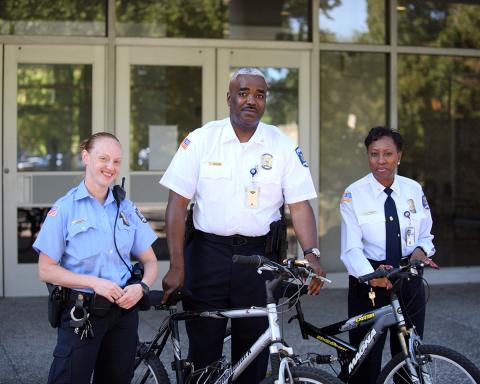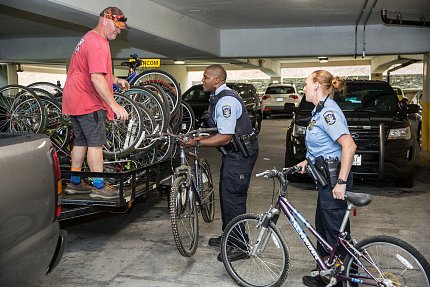Cutting the Chains
NIH Police Donate Abandoned Bicycles

Photo: Chia-Chi Charlie Chang
For the many NIH’ers who enjoy biking to work, it just got a little easier to find a spot at a campus bike rack. In recent months, the NIH Police began clamping down on abandoned bicycles, removing dozens of them so far and sending unclaimed bikes out to a good cause.
“A lot of people had complaints about not being able to park their bikes on campus due to the bike racks being full,” said Cpl. Christine Fedorisko, community police coordinator. “Some of these bikes had been sitting abandoned for years.”
So she and her NIH Police colleagues took action. They began putting a 5-day warning notice on abandoned bikes; if nobody claimed them, the police cut the locks and wheeled them over to a storage facility where they sat for a couple of months, giving their owners another chance to claim them.
“I realized I was cutting a lot of bikes,” said Fedorisko, “and these bikes were in good condition—basically some flat tires, some rusty chains, some seat wear and tear.”
Who would abandon such nice bikes? Fedorisko learned that many trainees who brought bikes to get around campus were unable to travel home with them. She also heard stories of lost bike lock keys and flat tires or minor damage that remained unfixed.

Photo: Village Bicycle Project, Ghana
It seemed a shame to send these usable bikes to recycling centers, as was done in the past when the NIH Police periodically removed abandoned bikes. So NIH Police Chief Alvin Hinton suggested donating the bikes and Fedorisko set out to find a suitable recipient.
She picked up 43 abandoned bikes over the past 2 months. After sending an NIH-wide last-chance-to-retrieve-your-bike email, she reports that 3 were claimed and the remaining 40 were donated to Bikes for the World, a nonprofit that sends bikes and bike parts to lower-income people in the United States and abroad. This shipment went to Village Bicycle Projects in Ghana and Sierra Leone.
The NIH Police coordinated the effort with the NIH Bicycle Commuter Club, which has a longstanding relationship with Bikes for the World. For nearly a decade, the NIHBCC has helped collect unwanted bikes and donated them to this organization.
Bikes for the World donates most bikes to countries in Africa and Central America as well as to youth projects in Barbados and the Philippines. Others get donated to disadvantaged communities locally. The organization takes any bike with at least some workable parts, bike accessories and even old parts that are a little worn or rusty.
“Before you replace a part, consider donating it,” said Yvette Hess, outreach coordinator at Bikes for the World. “It may have too much wear for you, but it still has value to others, especially overseas.”
Fedorisko, who aims to get the NIH Police more actively involved in community projects, said this is the first time the police have ever made this type of donation.
“People see the police department right now as parking tickets and traffic enforcement,” she said. Many are unaware of the force’s host of community activities, such as the Coffee with a Cop program at the Children’s Inn, facility tours, details downtown, safety initiatives and Take Your Child to Work Day and Bike to Work Day events.
“We’re trying to get the police department to have a more positive impact on the community,” said Fedorisko. “Yes, we have to get out there and write tickets; that’s important. Parking is a huge issue. But I don’t want [people’s perceptions of us] to be all negative.”

Photo: Bikes for the Phillippines
Another bike-related service the police provide is registration. When none of the abandoned bikes in the storage facility had an NIH or even a county decal, Fedorisko put the pedal to the metal encouraging all NIH’ers to register their bikes.
“You’d be surprised how many people don’t even know where the serial number is on their bike,” she said.
In the past month, Fedorisko registered some 400 bikes on campus. “I was able to get out there and show people the best locks to use—the U-lock is the best—and I warned them about the racks by the Medical Center Metro station, which is a high theft area right now.”
There are covered and uncovered bike racks behind most buildings on campus and more are being built. Fedorisko has noticed some NIH’ers leaving their bikes by fences or railings, or trying to bring them into their offices, but these are violations for which you can get cited. “The only proper place to park your bike is at a bike rack or in a storage locker,” she said.
And don’t forget basic bike safety. Wear a helmet and high-visibility clothing; have reflectors on your bike and perhaps a bell or horn; use hand signals and be aware of pedestrians and drivers. It’s also a good idea not to have earbuds in, said Fedorisko, to help stay more aware of your surroundings.

Photo: Chia-Chi Charlie Chang
“When I came to NIH, I realized what a parking shortage we have on this campus,” she said. “We want more people taking Metro and biking.”
Have a bike or bike parts to donate? Contact Ellen Condon, NIHBCC administrator, who can facilitate the donation. Or, call Bikes for the World at (703) 740-7856. Their warehouse is located in Rockville and they’re always in need of volunteers.
Want to register your bike with NIH or report an abandoned bike you’ve seen on campus? Call (301) 496-3020 or email Christine.fedorisko@nih.gov.
